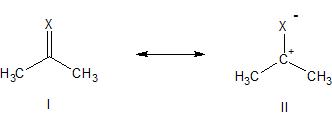Why are imines more susceptible to reduction than carbonyl compounds? Imines react with $\ce{NaCNBH3}$ while the carbonyls don't.
2 Answers
Generally speaking, I think it is the reverse - carbonyls are reduced faster than imines with various sources of $\ce{H^-}$. The reason usually cited (see pages 2-4 of this reference) for this behavior is that the imine double bond is less polarized than the carbonyl double bond. In the figure below resonance structure II contributes less when X=N as compared to the case X=O, due to the decreased electronegativity of nitrogen compared to oxygen.

However, if the reaction is run under mildly acidic conditions, since the imine nitrogen is more basic than the carbonyl oxygen, more of the imine nitrogen will be protonated than the carbonyl oxygen. This will make the protonated imine carbon much more electrophilic (positively polarized). Consequently, under acidic conditions, an imine may be more reactive than a carbonyl to nucleophilic reduction (in addition to the above reference, also see this reference).
-
$\begingroup$ Oh, it's because imines are protonated in a bigger amount. Thank you. $\endgroup$– EJCCommented Sep 5, 2014 at 20:37
-
$\begingroup$ You mention "acidic conditions". But can there be hydride sources (that do not break down to H2) under acidic conditions? $\endgroup$ Commented Apr 29, 2017 at 12:19
-
2$\begingroup$ @OscarLanzi Yes, take a look at the last reference (section 1.2.2.1) in my answer. They mention use of $\ce{NaBH3CN}$ and $\ce{NaBH4}$ \ $\ce{RCO2H}$ under mildly acidic conditions. $\endgroup$– ronCommented Apr 29, 2017 at 13:57
under acidic conditions, imines can be activated in a similar way to carbonyl compounds. Furthermore, since the imines nirogen is more basic than the carbonyl carbon, the equilibrium lies further towards species than it does i the corresponding carbonyl series. iminium ions are excellent electrophiles and reactive intermediates in synthesis.
